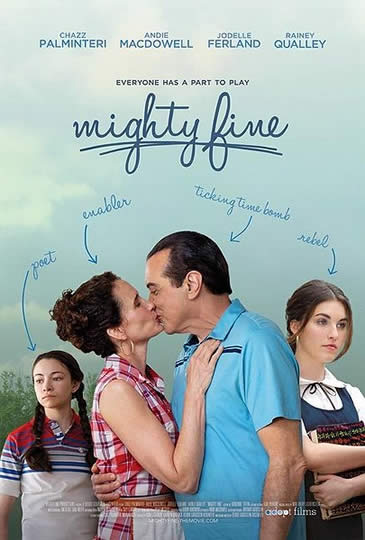 Set in the 1970s, Mighty Fine is the story of Joe Fine (Chazz Palminteri) a charismatic, high spirited man, who relocates his family—wife Stella (Andie MacDowell), daughters Natalie (Jodelle Ferland) and Maddie (Rainey Qualley)—from Brooklyn to New Orleans, in search of a better life. Joe’s devotion to his family knows no bounds, and he seeks to provide them with the ultimate in the good life, from a lavish home to a steady string of extravagant gifts.
Set in the 1970s, Mighty Fine is the story of Joe Fine (Chazz Palminteri) a charismatic, high spirited man, who relocates his family—wife Stella (Andie MacDowell), daughters Natalie (Jodelle Ferland) and Maddie (Rainey Qualley)—from Brooklyn to New Orleans, in search of a better life. Joe’s devotion to his family knows no bounds, and he seeks to provide them with the ultimate in the good life, from a lavish home to a steady string of extravagant gifts.
Unfortunately, Joe’s spending spree is wildly out of touch with reality, as his apparel business is teetering on the brink of collapse, a fact he refuses to accept. On the surface Joe is a charmer with a king-sized personality, but underneath he is possessed by a deep-rooted anger which he frequently turns on the family he loves. An emotional powder keg ready to explode at any instant, Joe holds his wife and daughters captive to his unpredictable mood swings.
We had the wonderful opportunity to interview Chazz Palminteri and Andie MacDowell about their performances in Mighty Fine.
Bijan Tehrani: How challenging was it for you to play Joe? His role was intricate and must have been difficult to portray.
Chazz Palminteri: I interviewed a lot of people that were bi-polar or manic-depressive—a handful—and I spoke to them and I also spoke to the director, Debbie Goodstein-Rosenfeld. This film was based on her dad’s life, so she would tell me intimate things about her dad. I did my research on the character and just prepared the best I could.
Bijan: You were very convincing in Joe’s transformation from a nicer person to this evil character, how deliver that sudden change and make it so believable?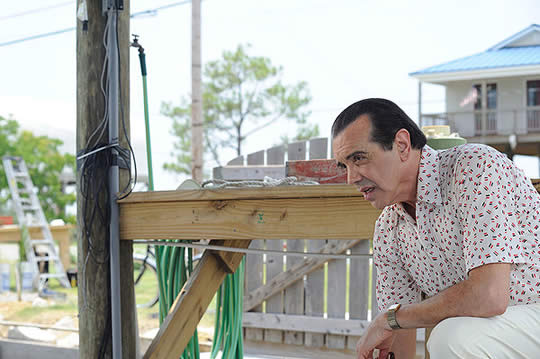
Chazz: That’s the art of acting! After so many years, you go through those emotions and you can call on those emotions any time you want. I mean the whole key is that you have to make it honest, especially when you are dealing with a manic depressive. This is what they do; one minute they are happy, and a little something can just set them off. But it has to come from a place—it has to be organic or else it does not look right.
Bijan: Andie, Stella’s character provides its challenges as well; she is quiet, but you can see that there is a storm inside her. How did you manage to understand Stella and play her so well?
Andie MacDowell: I’ve had experience with people that are manic depressive and my mother was an alcoholic, so I grew up in a house where there was a very co-dependent relationship—or a completely codependent relationship—with my mother, so I know what it was like to try and keep the peace in the middle of chaos and not knowing what to expect. Even though I don’t think I was ever as submissive as Stella, I do know what it means to live in a family where keeping the peace is just something that you do in your daily life, so I had that past experience. I think all of us have experienced it with someone, somewhere in our lives: that dynamic of having to keep peace in a tenuous relationship of some typoe.
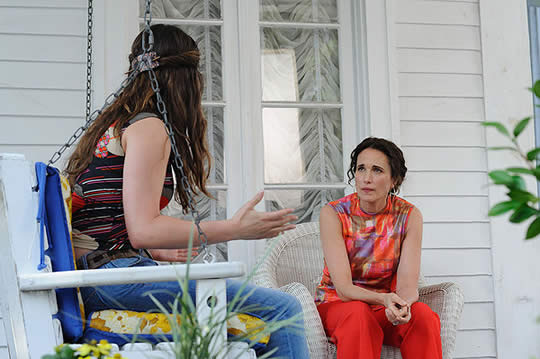 Bijan: How did Stella’s experience with the Holocaust help shape your performance?
Bijan: How did Stella’s experience with the Holocaust help shape your performance?
Andie: It was a big part of her history, and I think her history defines her. You can never escape our history unless it is confronted, like what confronted Stella. She can make a shift in who she is, but she definitely had some issues with standing up for herself and being strong, and I think it was easy for her to just allow things to happen because she had to hide. She stayed hidden as a way to survive, so her survival instincts kept her from standing up and kept her quiet.
Bijan: Chazz, did your experience as a writer and director help you in having a deeper understanding of the screenplay and what the director wants from you?.
Chazz: It absolutely does help me. I can see the director and we can talk about what she wants from a scene as a director, where it is going and how they may edit it. That helps me a great deal, as far as preparing for the scene.
Bijan: You have worked with so many different film directors, including the likes of Woody Allen and other big names, and you were in the brilliant A Bronx Tale. How have you maintained your distinct acting style over such a long career?
Chazz: I am a member of the Actors Studio, so I come from the same school as Pacino and Harvey Keitel. The essence of that acting is realism, which was started by Stanislavski, and Marlon Brando was the first who was the star in the forefront in the 40’s, adapting that style when he came on stage and did A Streetcar Named Desire. Therefore, if a style of acting is real, you can look at the old films and see that the style was a little more theatrical, and this style here is more realism.
Bijan: Describe your experiences on camera in Mighty Fine; did the cast mesh well? 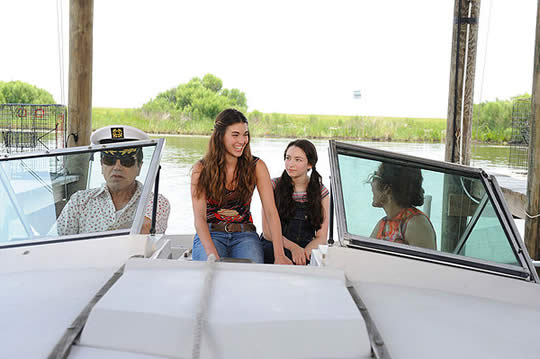
Chazz: A lot of my scenes were with Andie MacDowell. She is such a seasoned pro; she has been around a long time, and her daughter played my daughter in the movie. So this was her first film, so she was very open to suggestions and I helped her as much as I could—she is actually terrific actress. So you have to have good actors and people with talent because you can only be as good as the people you are acting with.
Bijan: Andie, looking at your body of work as an actress, what stands out is your diverse characters in films ranging from “The End of Violence” and “Bad Girls”, to “Sex Lies and Videotape” and so many fantastic films with outstanding performances. How do you manage to shine on such a wide spectrum of roles and how did you apply this to Stella?
Andie: I use a multitude of techniques. I am method type of actor, where you look at the interior of your life and utilize information that you have stored in your body, in your mind, and your memory. I used those tools—and that is the great thing about having a difficult childhood; I call it my toolkit! I have a variety of things to use, and it comes to good use. I have also learned from other actors and people that I have worked with. Like anything, else the more you do it, the more skill you will develop. For Stella, I worked with a Polish woman in New York and I found that she was the most helpful to me and she was a great inspiration. I got so many things from her as a person by just observing, listening and taking the cues from someone else.
Bijan: What was it like to be in a film with your daughter?
Andie: I am very professional and I have a really good work ethic, so when I was at work, I was not her mother—I was her acting comrade and partner. We worked as peers, not work as mother and daughter, and it was really easy for me to pay that price and have that cut. At the end of the day when we went home, I was her mom, but when I was at work, we were just working together and that was exactly what it felt like to me. I don’t think it would have been a bad situation if I tried to mother her at work, but we were just partners.
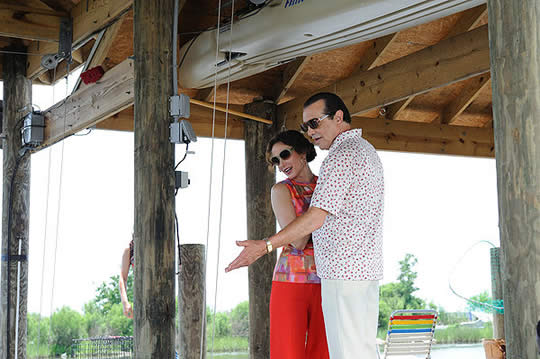 Bijan: How was your relationship with the director of the film? Did you do a lot of rehearsals or did you improvise a lot on the set?
Bijan: How was your relationship with the director of the film? Did you do a lot of rehearsals or did you improvise a lot on the set?
Chazz: Yes, we did some rehearsals, we did a lot of meetings on the script, and I was the executive producer as well. We were in constant communication to figure out what we should write, what we needed to shoot, what we needed to cut, and how we could make it tighter. So yes, it was a long conversation.
Andie: Debbie was really sweet, and this is something that has a lot of meaning to her—this is her life and her story, and I think she did a really great job. She is a wonderful writer and I think the people who were working on the set—we had an amazing crew in New Orleans—they did a wonderful job and they worked super, super hard. I think part of the reason is that they had a lot of compassion for Debbie and the fact that this was her story.
Bijan: Andie, how was working with Chazz?
Andie: Chazz was amazing and he was really good with Rainey. He really took her under his wing and he was there for her 100%, so Rainey loved working with him as well. We had great chemistry on and off camera; we got along really well and had a lot of fun, so it was a great experience!
Bijan: The film confronts a difficult subject, but I think it’s one that everyone should see. What are your thoughts on the message of the film?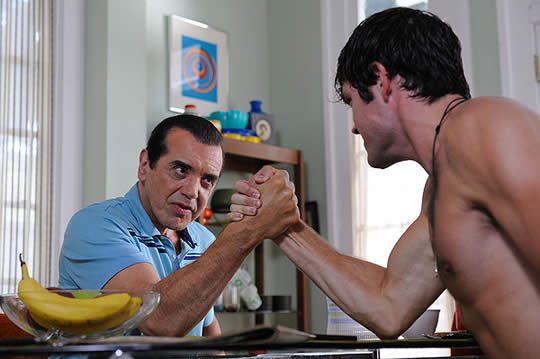
Chazz: You’re absolutely right. A lot of these things, people don’t want to talk about; they don’t want to talk about their husbands having rage issues, they have the idea that “as long as he does not hit me, it is okay”, and some can be physically and emotionally damaged. This is why we now have mental health clinics where women who are abused by their husbands can go and seek help. I think this is a very important movie, I agree with you.
Andie: I think that this is an important subject matter and I think that there are a lot of people out there that it will resonate with. Either that, or they will see Chazz’s character and see a piece of themselves or someone they know. There are a lot of tendencies towards that kind of personality that exists in our culture, and a lot of people don’t know how to define it. It is much more acceptable now, thank goodness, to think about mental disorders. I think we are much more open in our culture than we were in the time period that this took place, but I still think that there are things that people can learn about this subject matter.
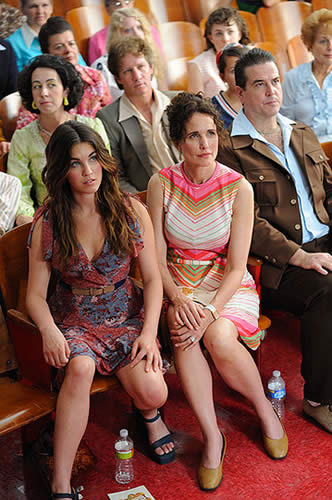 Bijan: Andie, you and Chazz are both actors that are loved internationally, and I think that is reflected in the two awards that you won from Europe: the Cesar Award in France, and the Golden Camera award in Germany. How have you captured the hearts of international audiences?
Bijan: Andie, you and Chazz are both actors that are loved internationally, and I think that is reflected in the two awards that you won from Europe: the Cesar Award in France, and the Golden Camera award in Germany. How have you captured the hearts of international audiences?
Andie: Well, I have done a lot of quirky films, more artistic type works, I have worked in Europe with several great filmmakers, and I have done films in England and Poland. I have worked in Europe a lot! I have lived in Paris and I probably resonate with Europe because they resonate with me. I love traveling and I love seeing international cultures, and it is really a piece of who I am. I think maybe people pick up on that overseas—it goes both ways; I love them and they love me (laughs)! I honestly can’t say why, but I’m glad they appreciate me.
Bijan: Chazz, as a film fan and critic, I am eager to see something else that you have written on the screen because you write brilliantly! A Bronx Tale reminded me of Vittorio De Sica’s films—are you planning to make any new movies?
Chazz: Yes, I am writing another film now. In fact, I just wrote a play which I will write a screenplay for, and the play just got optioned to go on Broadway. It is called Human, and I think it’s one of my finest works, so I hope to write the screenplay on that.
Bijan: Andie, what is your next project?
Andie: Right now, I am working on something called Jane by Design. It is a TV show with a bunch of young people and I am having a lot of fun. I play a really hard, arrogant and mean character; very high powered in the fashion world and a bit of a diva, so I am having fun right now doing that!
Bijan: Thank you both for your time, and best of luck on those promising future works!

